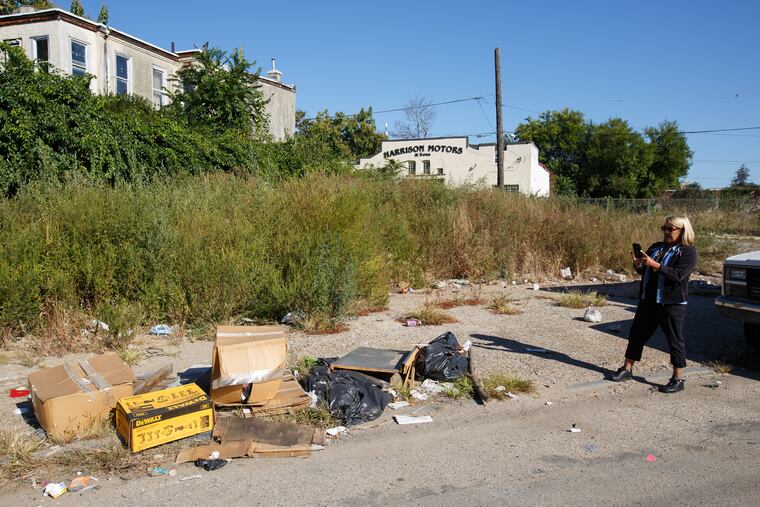Philly’s litter problem is no mystery. Why won’t City Hall step up and solve it? | Opinion
The city says it wants its citizens to care about litter, to do their part. The least it could do to is start by bringing something to the table.

Like many Philadelphians, I sweep my block from time to time. It's dirty work. There are soiled diapers, old food, construction debris, and, every once in a while, a dead animal.
Like many Philadelphians, I also know the frustration of watching the litter slowly creep back in, as it always does in a city perpetually beset by an endless tide of trash.
There is no mystery to why this happens: Of the 20 largest cities in the U.S., only Philly lacks a street-cleaning program.
Yet City Hall desperately wants the public to believe that litter is a mystery. Something to be studied. A Gordian knot to be solved at some unspecified later date.
For example, the city's Zero Waste and Litter Cabinet recently occupied itself with a study meant to determine if public trash cans actually reduce litter, even though numerous research papers have already demonstrated exactly this point. Earlier, the cabinet said it was developing a "data-driven" approach to litter, generating maps which showed, unsurprisingly, that litter was nearly everywhere.
>> READ MORE: In my Center City neighborhood, the filth and trash are impossible to ignore | Opinion
These efforts amount to a delay tactic. City Hall's litter mysticism obfuscates the fact that virtually every other city in the developed world effectively solved the litter problem years ago. In fact, Philadelphia itself solved this problem over a century ago when city fathers inaugurated its first litter-sweeping brigades.
We did not abandon these efforts because they did not work. In fact, in 1952, Philadelphia was twice named the "cleanest city in America" by national sanitation advocacy groups. Only in recent decades, as the city's population and economy diminished along with federal block-grant funding, did Philadelphia begin to erode its sanitation budget.
Even as late as the 2000s, portions of South Philly still received regular street cleaning. The death blow to street sweeping emerged not from austerity or uncertainty about its effectiveness but plain old parking politics.
Mayor Kenney himself has said he believes that voters were ready to boot South Philly Councilman Frank DiCicco out of office because they were sick of getting ticketed for not moving their cars.
>> READ MORE: Bring street sweeping back to Philly's neighborhoods
"It was only once a week, but he took so much grief for it, he stopped the program for fear of not being reelected," Kenney said. "I can't see why everybody should suffer as a result of the selfishness of some people that just don't want to move their cars for a couple hours one day a week."
But that was Kenney in 2015, when he was merely seeking the mayor's office. Three and a half years later, as mayor, there is still no timeline for restoring street sweeping. Perhaps Kenney sees a similar vulnerability with his own reelection just around the corner.
There are many benefits to basic, citywide sanitation. A recent study by Columbia University's Mailman School of Public Health showed that simply cleaning vacant lots in Philadelphia had a positive impact on surrounding crime rates. Waste left on city streets eventually washes into storm drains, out into the Delaware, and, eventually, the Atlantic Ocean. Cleaner streets bring increased property values, and, in turn, more city revenue through real estate taxes. City sanitation jobs are decently compensated union jobs in a city with high unemployment. But it should be enough that it's the right thing to do.
There are of course other, arguably more pressing issues in this city — endemic poverty, underfunded schools, rampant crime, to name just a few. The difference is that litter has a clear and attainable solution and that the city's own estimates peg the annual cost for restored citywide street sweeping in the millions of dollars. Even double or triple that estimate amounts to a rounding error in a multibillion-dollar annual budget.
>> READ MORE: 'Filthadelphia' no more: It's up to everyone to change our dirty reputation
The city will often point to its languid finances, but it has meanwhile spent millions on misguided educational efforts. There was the costly "UnLitterUs" ad campaign, which paid a glossy ad agency to create anti-litter PSAs featuring local poets. The millions spent on SWEEP patrols, ticketing officers who would in theory scold elusive litterbugs, but in practice mainly hand out fines to residents who put trash out too early. There are the costs of organizing the citywide Spring Clean Up, an annual effort meant to coax neighbors into becoming litter-collecting militias.
But there is little to show after spending more than a decade on these efforts, least of all a remotely clean city.
Again, it is no mystery why: In other cities, these would qualify as supplemental sanitation efforts. What are they supplementing here? To clean the streets in Philadelphia, as a neighbor, is to know futility. To know that your labors will be erased the moment you stop — or at least by the next trash day. It is the knowledge that you are part of no larger, coordinated strategy.
The city says it wants its citizens to care about litter, to do their part. The least it could do is start by bringing something to the table.
Ryan Briggs is a freelance writer in Philadelphia. @rw_briggs